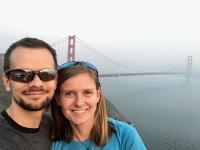Many people think that international vacations need to cost thousands of dollars and are a treat you can only make happen a few times in a lifetime. They picture fancy drinks at all-inclusive resorts, tiki torches and tiny umbrellas in Tahiti, spas in the south of France, or the kinds of hotels that fold your towels into elephants and peacocks. Well, that’s certainly one way to travel. If we saved for a few years, we could probably make that happen, too. But because we want to travel abroad multiple times a year, to a wider variety of destinations around the globe, that plan won’t work for us. We do it another way.
Some background: We’re not trust funders. Neither one of us inherited wealth. We left school with heaps of debt during the recession and, like many in our generation, have had periods of financial struggle since then. We work full time, (sometimes way too many hours), but all you see is us jet setting to London for a long weekend. So… how do we do it?
It’s actually really simple.
We live and travel as inexpensively as possible in order to maximize our adventure budget.
Traveling inexpensively means…
Plan smarter, Fly smarter, sleep smarter, play smarter
- We go wherever it is cheapest, especially to off-season and less-known destinations. We’re flexible with when we go and try to go to wherever the most inexpensive plane tickets are for a given trip. Our average international plane ticket cost $340 round trip in 2018.
- We primarily travel to destinations where cost of living is low and make sure that travel to more expensive countries is an infrequent minority.
- We fly on budget airlines and make sure we jump through all of their money-saving hoops. (Ex: check in online, pre-print or save your boarding pass, bring an empty water bottle and fill it in the airport terminal, bring your own meals instead of paying for a meal service, don’t pay to choose seats or for extra legroom, etc.)
- We pack only a personal item, avoiding checked luggage and carry on baggage fees.
- We sleep in single room Airbnbs, tents, in the back of the car, or with friends.
- We find ways to eat cheaply, including delicious street food, and are never disappointed.
- We bring a water bottle and a steripen so we can drink local tap water, instead of paying for bottled water. (This allows us a lot of flexibility, as well as security that we can find drinkable water anywhere we go.)
- We walk or take public transit (instead of taxis in most cases).
- We seek out attractions that are free.
- For local travel, we converted our Honda Element to a Motelement and use that as our vacation home on weekends. We usually park it at trail heads, in Walmart parking lots, on free Bureau of Land Management land, in friends’ driveways, or anywhere else where we don’t have to pay a campground fee.
Living inexpensively means…
- We share 1 car. The Motelement doubles as my commute vehicle two days a week and Josh works from home.
- We do our own car maintenance and repairs in most cases.
- We rent a 1 small, bedroom apartment in a less expensive community.
- We don’t have kids (yet).
- We eat out and order in about once per month and cook the rest of our meals at home (excepting special occasions).
- We almost never go to movies, out for drinks, or to concerts, or whatever other people do for fun. (I’m not even sure what that is, really.)
- We don’t buy single-purpose household items unless they are absolutely necessary and we don’t purchase knick knacks.
- We buy simple clothing that will last a long time and mend it when needed (For us, Adventure>>>Fashion).
- We cut it down to the basics: I have 4 pairs of shoes for work or city-wear. I’ve found that anything past that is unnecessary. Josh has even fewer than that.
- We buy things in bulk to save per unit cost, such as paper towels, cleaning supplies, etc.
- We eat whatever produce is cheap and in season, buy meat only when we find a good price, and vacuum pack and freeze it.
- I make DIY backpacking food and Josh makes DIY just about everything else. Josh also repairs things when they break and patches them for us when they have gotten worn.
- We buy last-season and off-season adventure gear when it is on sale.
- We set an annual travel budget and earmark money specifically for our trips. It took me a full year to save for our Israel, Palestine, and Egypt trip. That trip alone cost us most of our 2016 travel budget. In 2018, we went to 10 countries with cheaper flights for shorter periods of time.
I think you get the idea. If you want to travel more, I would encourage you to look critically at this list, think of ways you spend and save money, and decide what you could live without.
So, which of these do you want more?
To go out for a drink this Friday, or to drink a mojito in Cuba?
To buy Starbucks tomorrow morning, or drink organic coffee on a farm in Panama in 6 months?
Pay for an expensive wedding, or go on a safari for honeymoon?
We support whatever choice you make. Good luck and happy traveling!



